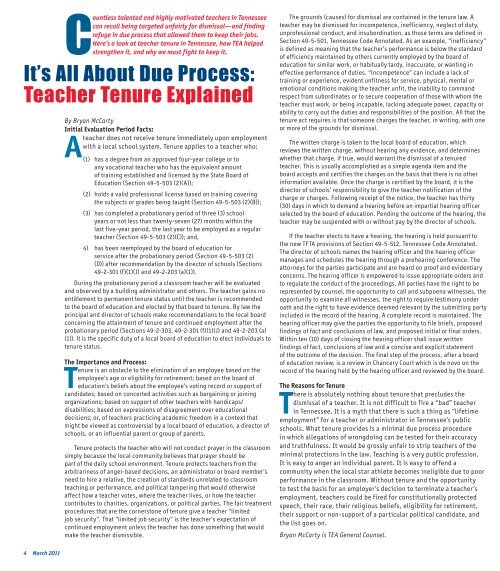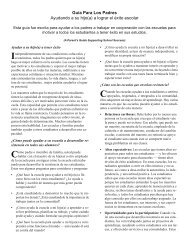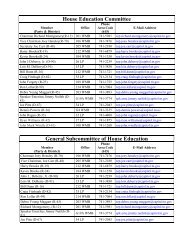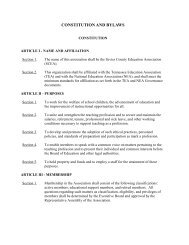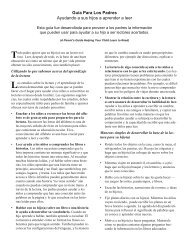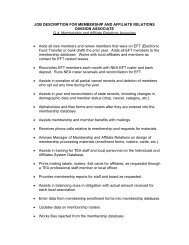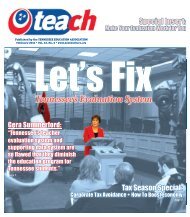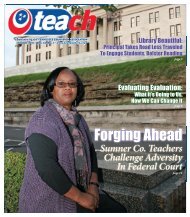Tennessee's Teachers Will Not Be Silenced - Tennessee Education ...
Tennessee's Teachers Will Not Be Silenced - Tennessee Education ...
Tennessee's Teachers Will Not Be Silenced - Tennessee Education ...
You also want an ePaper? Increase the reach of your titles
YUMPU automatically turns print PDFs into web optimized ePapers that Google loves.
Countless talented and highly motivated teachers in <strong>Tennessee</strong><br />
can recall being targeted unfairly for dismissal—and finding<br />
refuge in due process that allowed them to keep their jobs.<br />
Here’s a look at teacher tenure in <strong>Tennessee</strong>, how TEA helped<br />
strengthen it, and why we must fight to keep it.<br />
It’s All About Due Process:<br />
Teacher Tenure Explained<br />
By Bryan McCarty<br />
Initial Evaluation Period Facts:<br />
A<br />
teacher does not receive tenure immediately upon employment<br />
with a local school system. Tenure applies to a teacher who:<br />
(1) has a degree from an approved four-year college or to<br />
any vocational teacher who has the equivalent amount<br />
of training established and licensed by the State Board of<br />
<strong>Education</strong> (Section 49-5-503 (2)(A));<br />
(2) holds a valid professional license based on training covering<br />
the subjects or grades being taught (Section 49-5-503 (2)(B));<br />
(3) has completed a probationary period of three (3) school<br />
years or not less than twenty-seven (27) months within the<br />
last five-year period, the last year to be employed as a regular<br />
teacher (Section 49-5-503 (2)(C)); and,<br />
4) has been reemployed by the board of education for<br />
service after the probationary period (Section 49-5-503 (2)<br />
(D)) after recommendation by the director of schools (Sections<br />
49-2-301 (f)(1)(J) and 49-2-203 (a)(1)).<br />
During the probationary period a classroom teacher will be evaluated<br />
and observed by a building administrator and others. The teacher gains no<br />
entitlement to permanent tenure status until the teacher is recommended<br />
to the board of education and elected by that board to tenure. By law the<br />
principal and director of schools make recommendations to the local board<br />
concerning the attainment of tenure and continued employment after the<br />
probationary period (Sections 49-2-303, 49-2-301 (f)(1)(J) and 49-2-203 (a)<br />
(1)). It is the specific duty of a local board of education to elect individuals to<br />
tenure status.<br />
The Importance and Process:<br />
Tenure is an obstacle to the elimination of an employee based on the<br />
employee’s age or eligibility for retirement; based on the board of<br />
education’s beliefs about the employee’s voting record or support of<br />
candidates; based on concerted activities such as bargaining or joining<br />
organizations; based on support of other teachers with handicaps/<br />
disabilities; based on expressions of disagreement over educational<br />
decisions; or, of teachers practicing academic freedom in a context that<br />
might be viewed as controversial by a local board of education, a director of<br />
schools, or an influential parent or group of parents.<br />
Tenure protects the teacher who will not conduct prayer in the classroom<br />
simply because the local community believes that prayer should be<br />
part of the daily school environment. Tenure protects teachers from the<br />
arbitrariness of anger-based decisions, an administrator or board member’s<br />
need to hire a relative, the creation of standards unrelated to classroom<br />
teaching or performance, and political tampering that would otherwise<br />
affect how a teacher votes, where the teacher lives, or how the teacher<br />
contributes to charities, organizations, or political parties. The fair treatment<br />
procedures that are the cornerstone of tenure give a teacher “limited<br />
job security”. That “limited job security” is the teacher’s expectation of<br />
continued employment unless the teacher has done something that would<br />
make the teacher dismissible.<br />
The grounds (causes) for dismissal are contained in the tenure law. A<br />
teacher may be dismissed for incompetence, inefficiency, neglect of duty,<br />
unprofessional conduct, and insubordination, as those terms are defined in<br />
Section 49-5-501, <strong>Tennessee</strong> Code Annotated. As an example, “inefficiency”<br />
is defined as meaning that the teacher’s performance is below the standard<br />
of efficiency maintained by others currently employed by the board of<br />
education for similar work, or habitually tardy, inaccurate, or wanting in<br />
effective performance of duties. “Incompetence” can include a lack of<br />
training or experience, evident unfitness for service, physical, mental or<br />
emotional conditions making the teacher unfit, the inability to command<br />
respect from subordinates or to secure cooperation of those with whom the<br />
teacher must work, or being incapable, lacking adequate power, capacity or<br />
ability to carry out the duties and responsibilities of the position. All that the<br />
tenure act requires is that someone charges the teacher, in writing, with one<br />
or more of the grounds for dismissal.<br />
The written charge is taken to the local board of education, which<br />
reviews the written charge, without hearing any evidence, and determines<br />
whether that charge, if true, would warrant the dismissal of a tenured<br />
teacher. This is usually accomplished as a simple agenda item and the<br />
board accepts and certifies the charges on the basis that there is no other<br />
information available. Once the charge is certified by the board, it is the<br />
director of schools’ responsibility to give the teacher notification of the<br />
charge or charges. Following receipt of the notice, the teacher has thirty<br />
(30) days in which to demand a hearing before an impartial hearing officer<br />
selected by the board of education. Pending the outcome of the hearing, the<br />
teacher may be suspended with or without pay by the director of schools.<br />
If the teacher elects to have a hearing, the hearing is held pursuant to<br />
the new TFTA provisions of Section 49-5-512, <strong>Tennessee</strong> Code Annotated.<br />
The director of schools names the hearing officer and the hearing officer<br />
manages and schedules the hearing through a prehearing conference. The<br />
attorneys for the parties participate and are heard on proof and evidentiary<br />
concerns. The hearing officer is empowered to issue appropriate orders and<br />
to regulate the conduct of the proceedings. All parties have the right to be<br />
represented by counsel, the opportunity to call and subpoena witnesses, the<br />
opportunity to examine all witnesses, the right to require testimony under<br />
oath and the right to have evidence deemed relevant by the submitting party<br />
included in the record of the hearing. A complete record is maintained. The<br />
hearing officer may give the parties the opportunity to file briefs, proposed<br />
findings of fact and conclusions of law, and proposed initial or final orders.<br />
Within ten (10) days of closing the hearing officer shall issue written<br />
findings of fact, conclusions of law and a concise and explicit statement<br />
of the outcome of the decision. The final step of the process, after a board<br />
of education review, is a review in Chancery Court which is de novo on the<br />
record of the hearing held by the hearing officer and reviewed by the board.<br />
The Reasons for Tenure<br />
There is absolutely nothing about tenure that precludes the<br />
dismissal of a teacher. It is not difficult to fire a “bad” teacher<br />
in <strong>Tennessee</strong>. It is a myth that there is such a thing as “lifetime<br />
employment” for a teacher or administrator in <strong>Tennessee</strong>’s public<br />
schools. What tenure provides is a minimal due process procedure<br />
in which allegations of wrongdoing can be tested for their accuracy<br />
and truthfulness. It would be grossly unfair to strip teachers of the<br />
minimal protections in the law. Teaching is a very public profession.<br />
It is easy to anger an individual parent. It is easy to offend a<br />
community when the local star athlete becomes ineligible due to poor<br />
performance in the classroom. Without tenure and the opportunity<br />
to test the basis for an employer’s decision to terminate a teacher’s<br />
employment, teachers could be fired for constitutionally protected<br />
speech, their race, their religious beliefs, eligibility for retirement,<br />
their support or non-support of a particular political candidate, and<br />
the list goes on.<br />
Bryan McCarty is TEA General Counsel.<br />
An Urgent Message to all <strong>Tennessee</strong> Educators!<br />
SB 102 — sponsored by Sen. Dolores Gresham (R-Somerville). This bill<br />
would remove from TEA the right to elect teacher representatives<br />
on the Board of Trustees of the <strong>Tennessee</strong> Consolidated Retirement<br />
System (TCRS). Your message to legislators might include:<br />
• <strong>Teachers</strong> have every right to be involved in decision-making regarding<br />
their hard-earned retirement benefits.<br />
• This change in law would weaken the teacher voice by making<br />
retirement board members political appointments.<br />
HB 159/SB 136 — sponsored by Rep. Glen Casada (R-College Grove) and<br />
Sen. Bill Kentron (R-Murfreesboro). This bill would prohibit payroll dues<br />
deduction for public employees. Your message to legislators might include:<br />
• This bill has nothing to do with education reform.<br />
• It is obviously an attempt to weaken the rights of employees and their<br />
association.<br />
HB 160/SB 139 — sponsored by Rep. Glen Casada (R-College Grove) and Sen.<br />
Bill Ketron (R-Murfreesboro). This bill would make it illegal for TEA’s<br />
political action committee to make contributions to any candidate.<br />
Your message to legislators might include:<br />
• This bill is an overt attempt to silence the collective voice of our<br />
Association.<br />
The careers of <strong>Tennessee</strong>’s <strong>Teachers</strong><br />
are at stake!<br />
Even more “bad bills” are being introduced to the Legislature.<br />
Several bills have been filed in the 107th <strong>Tennessee</strong> General<br />
Assembly that attack all educators and the <strong>Tennessee</strong> <strong>Education</strong><br />
Association. To assist in the effort to defeat these punitive bills,<br />
it is essential that our legislators receive a Vote “NO” message<br />
from every educator across the state. These bills have nothing<br />
to do with “education reform” in <strong>Tennessee</strong>.<br />
HB 130/SB 113 — sponsored by Rep. Debra Maggart<br />
(R-Hendersonville) and Sen. Jack Johnson (R-College Grove).<br />
Simply put, this bill would completely repeal the<br />
<strong>Tennessee</strong> Professional Negotiations Act. Your message<br />
to legislators might include:<br />
• Student learning conditions are, in fact, teachers working<br />
conditions.<br />
• This bill would “turn back the clock” and is an attempt<br />
to silence the voice of teachers regarding all aspects of<br />
employment, including working conditions, salaries and<br />
benefits.<br />
Your Help is Needed!<br />
TEA leaders want to impress on<br />
members that these bills are very<br />
real threats and could pass in the<br />
near future. Our strength<br />
in fighting these attacks<br />
lies solely in massive<br />
opposition from our<br />
members across<br />
the state. This is the<br />
time to speak out<br />
— if you wait<br />
it may be<br />
too late!<br />
Contact your<br />
legislators now by<br />
going to<br />
TEA’s Legislative<br />
Action Center:<br />
http://capwiz.com/<br />
nea/tn/home/<br />
4 March 2011 5<br />
www.teateachers.org


